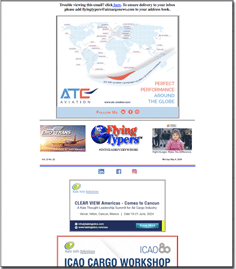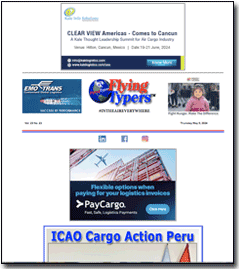| 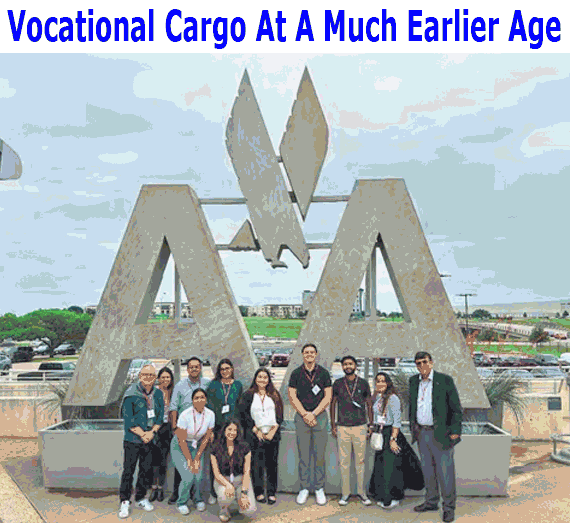
FIU students on a recent trip visited American Airlines Cargo
and DFW Airport to see the actual operations; forwarders in the
local community also made themselves available.
|
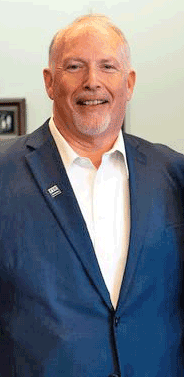 Mike White needs no introduction with our readers. Mike has a CV and presence
in the aviation and airfreight industry that is second to none. His tenure
in CNS as President was most inspirational for all of us.
Mike White needs no introduction with our readers. Mike has a CV and presence
in the aviation and airfreight industry that is second to none. His tenure
in CNS as President was most inspirational for all of us.
Everybody knows Mike White: his presence
is immediate wherever he goes.
In other words when it comes to clear thinking and realizing where we
are or should be heading as an industry:
We Like Mike!
The question today is that in a business
that needs lots of young executives whose attention may be drawn to other
careers, where will the next generation of air cargo executives will come?
Grateful that Mike sat down with us and
answered questions with regard to his current activity at PayCargo and
at his role as a driving force for that company’s involvement at
Florida International University (FIU).
The idea here is to learn and share a yeoman
and pioneering effort by PayCargo via its involvement in FIU to develop
and build vocational and educational programs, for the next generation
of logisticians.
Developing Future Logisticians
As example, how does FIU insure that the
programs they advance remain up-to-date and relevant in the fast changing
business climate?
We also asked Mike how can one get involved
in this initiative and what are the expectations, milestones and events?
Time Is Right
Interestingly there were several points
that connect this conversation with some of the comments and statements
we heard at FIATA during the recent HQ meeting and at TIACA in their Brussels
meeting held at the end of 2023.
Mike declared the main objective to involve
PayCargo within FIU is to help their program grow and become a world class
logistics program, in order to get students to share in the real world,
to understand the need for the industry, so they are actually better prepared
to get into the workforce.
“The university and the school of
business offers a multi-modal atmosphere particularly focused on transport.”
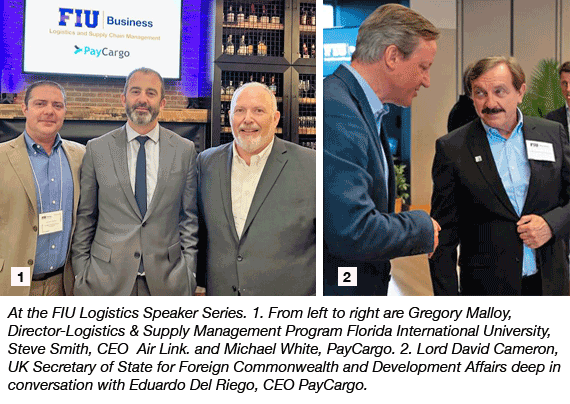 |
The Heart of the Matter
Eduardo Del Riego, CEO of PayCargo, was
a FIU graduate and devised a cooperation with FIU with the goal of supporting
the university to achieve the objective of a top-notch program for today’s
logistics; previously Eduardo had worked with the Dean in the school of
business, Dr. Joanne Li, now Chancellor at the University of Nebraska
at Omaha.
At the time that Mike was still at the helm
of CNS, both Del Riego and Li came to him to understand how his experience
could help the university program to grow and become an outstanding program.
Never Too Early To Learn
“At the time, I had previously worked
with universities on internships, I saw that the students were not prepared
for the real world, so it became more and more obvious that if you had
to retrain the candidates you had hired, you were almost obliged to re-educate
them . . . ”
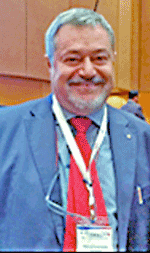 Mike’s
reasoning was proof of a rather common situation, which I can assure our
readers is not peculiar to the U.S. alone: there is a gap to be filled
between educational programs and what is actually required on the job. Mike’s
reasoning was proof of a rather common situation, which I can assure our
readers is not peculiar to the U.S. alone: there is a gap to be filled
between educational programs and what is actually required on the job.
That situation was pointed up by Marco Sorgetti,
(left) FT Senior Contributing Editor/Special Commentaries,
who shares his current first-hand teaching experiences:
“My students in Italy seem to have
the same issues, and I heard similar comments during the meetings at FIATA’s
HQ Meetings last month.”
Banking on the accumulated experience, FIU’s program is running
its second year and will surely continue capturing more and more interest.
Mike explained that education programs may
even have to consider personalization issues, quoting the example of when
he was at United:
“We had three interns from three different
universities and we realized that the student who had been trained in
Knoxville was too FedEx specific to be inserted in our program without
re-training,” Mike declared.
Too Soon To Know It All
Another issue could be overconfidence:
“Students thought they knew more than
they actually did, some could be knowledgeable in a particular area, but
lagged behind in others, so this program was designed to bring students
to a multimodal role, in airfreight, and also in rail, road and maritime,”
Mike said.
“We meet quarterly as an advisory
board reporting to FIU Dean William Hardin: our goal is to work with the
curriculum to ensure the objective is achieved.”
The issue of funding was also discussed;
in a program of this scope devotion and support are welcome.
Mike makes clear his deep and abiding appreciation
for the support offered from other resources.
“There are teachers from all areas
of the business, with strong support from associations with some leaders
functioning as mentors and teachers,” he said
Hearing several well-known personalities in the business had joined, “quite
a comprehensive representation” was Marco’s comment.
In terms of outcomes, Michael White was
proud to mention many supporters in American Airlines, PayCargo, and UPS
Supply Chain Solutions as well as other forwarding agents’ entities.
The FIU program consists of an undergraduate,
a graduate and a master level.
“Grow the program and make it more
of an international program,” was the objective of the institution
and in the State of Florida there is a lot of excitement for this opportunity,”
Mike White said.
Share Bettering The Future
Then there came the question of joining
forces with organizations like FIATA, IATA, TIACA or other relevant entities.
Mike admitted to talks with IATA related
to air cargo, for parts that could be added in the curriculum; there were
exchanges with NCBFAA, which also produced an indirect advantage: group
membership for students in some associations, for students to get involved
and get an understanding of the industry as early as possible.
Start At An Earlier Age
“FIU has mobilized its resources online
and in person “to make students understand what logistics is about.”
To that end support is growing where the
rubber meets the road or runway.
American Airlines Cargo and DFW Airport invited students to see the actual
operations; forwarders in the local community also made themselves available,
so the students could get familiar with the milieu.
“The initiative is to start before
the university level, beginning in local high schools to understand, what
is logistics. Start at a much earlier age,” was the quotable consensus
of this encounter.
“No doubt college students prefer
to acquire some knowledge of our working environment even before thinking
of committing to further studies,” Marco Sorgetti said.
The PayCargo Experience
Elsewhere noting initiatives taken by the
White House regarding the cost and efficiency of logistics, Mike mentioned
his conversations with USAID, where real life scenarios were analysed,
e.g. the earthquake scenario in Peru. It appeared to be critical that
greater efficiencies were found from all parts of the logistics chain,
including payments.
PayCargo has a particular view on how the
supply chain intervals can be reduced by making payments more efficient
and convenient.
Most of these initiatives, PayCargo included,
tend to create a ‘known user’ environment, a group of users
that would work for the outside.
As such it would work for the customers
that are subscribing to a particular scheme, as opposed to what the bank
system does where everybody can access their services paying a fee.
The Way PayCargo Works
“PayCargo has a subscription system
as a payer,” Mike said adding, “participants benefit from
full visibility and can customize their relationships in their systems.
Services can be customized and run by smart phone, one can integrate and
accept the process: you buy and then pay the vendor based on agreed terms.
“It's easy, it creates a medium whereby
you can actually have a transaction and manage the payment in a more expeditious
manner without wasting too much time to find a stand-in.”
Now Appearing Center Stage
Obviously, the issue of ownership of data
and protection of data emerged at that point. Unsurprisingly this issue
had also taken center-stage (again) during the recent FIATA HQ meeting,
where it emerged at least in two distinctive moments of the four-day event.
“Payment data and invoice data are
extremely sensitive for all parties, carriers, forwarders and shippers
alike,” reports Marco Sorgetti who served as Director General for
FIATA (2011-2017).
“From the conversation we were having,
there appeared to be a sort of ‘jealousy of data’ and I can
report that at other times there had been even a kind of ‘appetite
for data’.
“Many years ago, when discussing security
measures in Brussels some of the maritime carriers’ representatives
were expecting legislation to force all parties to submit their data to
carriers, Marco said adding:
“This issue is in fact extremely sensitive
from a commercial point of view.
In reality I must register that it has not
been completely resolved even this long into it in 2024.
“It was still a recurring topic that
surfaced again and again in Geneva at the recent FIATA HQ Meeting,”
Marco said.
So, our conversation with Mike, which started
with PayCargo helping FIU to make its program really relevant and global,
ended on an open note on payment services, possibly identifying an entirely
new area of business.
“We have heard of authorized third
party data handlers at different times, in the last decade at least if
not earlier,” Marco added.
“I personally take the view that a
genuinely neutral data handler, independent of the influence of carriers,
shippers, forwarders would probably have a role to play in modern trade,
in particular if the adoption of the MLETR
becomes commonplace in the future,” Marco continued, adding:
“There is on one side an imperative
that dictates the rules of safety and security, but we also have to appreciate
that international trade can flourish only if a reasonable amount of confidentiality
is guaranteed.
“This is where I see a commercial
space that in my view has not yet been fully exploited.”
Thanks to leading edge top-flight dedicated
industry companies mentioned here and people like Eduardo Del Riego, Mike
White and Marco Sorgetti, the movement toward tomorrow has advocates who
are passionate about doing what it takes in education and business to
insure the future.
And they are looking for input from new
members with their thinking caps firmly affixed at graduation time around
the world.
GDA/SSA
|




